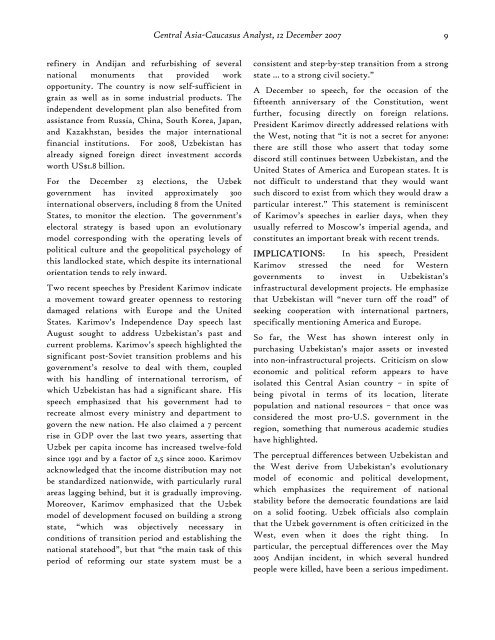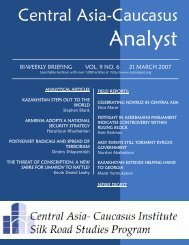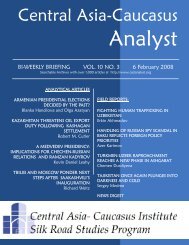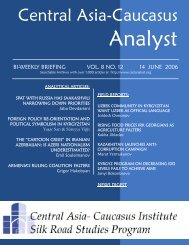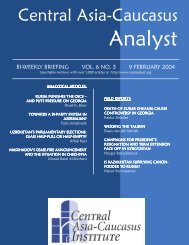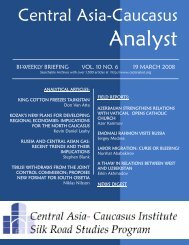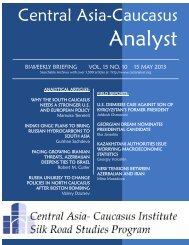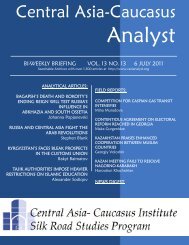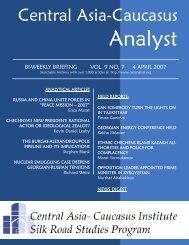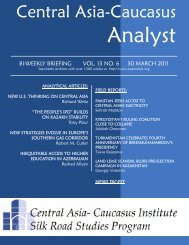Johanna Popjanevski - The Central Asia-Caucasus Analyst
Johanna Popjanevski - The Central Asia-Caucasus Analyst
Johanna Popjanevski - The Central Asia-Caucasus Analyst
You also want an ePaper? Increase the reach of your titles
YUMPU automatically turns print PDFs into web optimized ePapers that Google loves.
<strong>Central</strong> <strong>Asia</strong>-<strong>Caucasus</strong> <strong>Analyst</strong>, 12 December 2007 9refinery in Andijan and refurbishing of severalnational monuments that provided workopportunity. <strong>The</strong> country is now self-sufficient ingrain as well as in some industrial products. <strong>The</strong>independent development plan also benefited fromassistance from Russia, China, South Korea, Japan,and Kazakhstan, besides the major internationalfinancial institutions. For 2008, Uzbekistan hasalready signed foreign direct investment accordsworth US$1.8 billion.For the December 23 elections, the Uzbekgovernment has invited approximately 300international observers, including 8 from the UnitedStates, to monitor the election. <strong>The</strong> government’selectoral strategy is based upon an evolutionarymodel corresponding with the operating levels ofpolitical culture and the geopolitical psychology ofthis landlocked state, which despite its internationalorientation tends to rely inward.Two recent speeches by President Karimov indicatea movement toward greater openness to restoringdamaged relations with Europe and the UnitedStates. Karimov’s Independence Day speech lastAugust sought to address Uzbekistan’s past andcurrent problems. Karimov’s speech highlighted thesignificant post-Soviet transition problems and hisgovernment’s resolve to deal with them, coupledwith his handling of international terrorism, ofwhich Uzbekistan has had a significant share. Hisspeech emphasized that his government had torecreate almost every ministry and department togovern the new nation. He also claimed a 7 percentrise in GDP over the last two years, asserting thatUzbek per capita income has increased twelve-foldsince 1991 and by a factor of 2,5 since 2000. Karimovacknowledged that the income distribution may notbe standardized nationwide, with particularly ruralareas lagging behind, but it is gradually improving.Moreover, Karimov emphasized that the Uzbekmodel of development focused on building a strongstate, “which was objectively necessary inconditions of transition period and establishing thenational statehood”, but that “the main task of thisperiod of reforming our state system must be aconsistent and step-by-step transition from a strongstate … to a strong civil society.”A December 10 speech, for the occasion of thefifteenth anniversary of the Constitution, wentfurther, focusing directly on foreign relations.President Karimov directly addressed relations withthe West, noting that “it is not a secret for anyone:there are still those who assert that today somediscord still continues between Uzbekistan, and theUnited States of America and European states. It isnot difficult to understand that they would wantsuch discord to exist from which they would draw aparticular interest.” This statement is reminiscentof Karimov’s speeches in earlier days, when theyusually referred to Moscow’s imperial agenda, andconstitutes an important break with recent trends.IMPLICATIONS: In his speech, PresidentKarimov stressed the need for Westerngovernments to invest in Uzbekistan’sinfrastructural development projects. He emphasizethat Uzbekistan will “never turn off the road” ofseeking cooperation with international partners,specifically mentioning America and Europe.So far, the West has shown interest only inpurchasing Uzbekistan’s major assets or investedinto non-infrastructural projects. Criticism on sloweconomic and political reform appears to haveisolated this <strong>Central</strong> <strong>Asia</strong>n country – in spite ofbeing pivotal in terms of its location, literatepopulation and national resources – that once wasconsidered the most pro-U.S. government in theregion, something that numerous academic studieshave highlighted.<strong>The</strong> perceptual differences between Uzbekistan andthe West derive from Uzbekistan’s evolutionarymodel of economic and political development,which emphasizes the requirement of nationalstability before the democratic foundations are laidon a solid footing. Uzbek officials also complainthat the Uzbek government is often criticized in theWest, even when it does the right thing. Inparticular, the perceptual differences over the May2005 Andijan incident, in which several hundredpeople were killed, have been a serious impediment.


